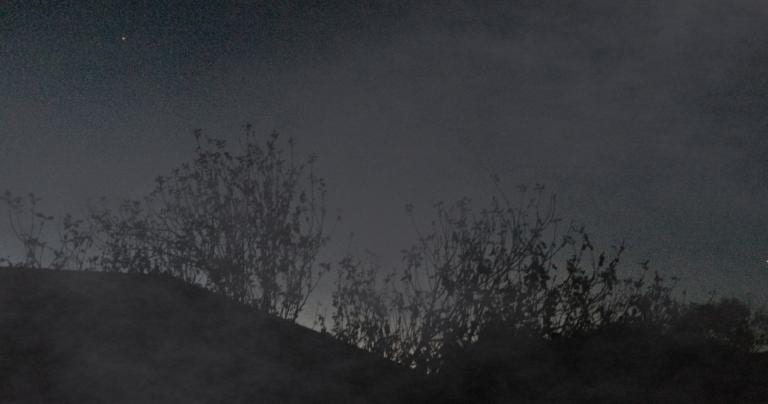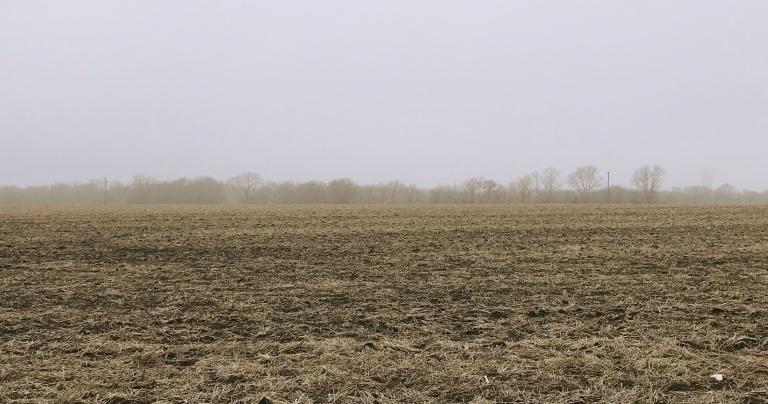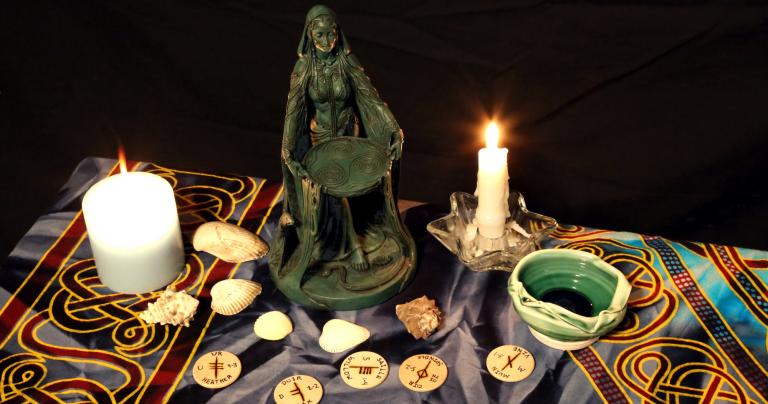Today we continue with more Conversations Under the Oaks. What are some things you can do to build a system of regular ritual devotions? What do you do when a deity stops talking to you? And how can we embrace darkness and shadow in our lives – even if we don’t like those terms?
The pattern of seasonal devotion – the eight festivals – is thoroughly documented. What about weekly or daily rituals? Is there a working example of a community that follows weekly rites or daily rites? Everyone seems to be urging me to spend more time in ritual, but aside from dawn greetings, I draw a blank. Ideas?
I don’t have a working example of a community that does this exactly as such, but I can talk about what I do.
My morning prayers are intended to be short and simple: Peace to the Quarters, a prayer to Ma’at for justice, and the Druid’s Prayer. At noon I pray for my family of blood, for my family of choice, for health and security, and that I may fulfill my sacred callings. In the evening I pray to the spirits of Nature, the spirits of the place where I am, the Fair Folk, and my ancestors. At night I pray to the deities with whom I am closely allied – that’s the most extemporaneous prayer of the cycle.
Saluting the sun and/or the moon is something else that could be done on a daily basis. I do that most days but not every day.
Pick a day for a deity and make offerings to them once a week. Pick a day for your ancestors. Do divination or general magical workings or both at the full moon.
Still don’t see what you’re looking for? Take a good look at Christian or Buddhist monks, see how they fill their days, and find a Pagan equivalent of it.
Anything you can do in the realm of devotion and/or magic, you can do on a regular basis. And that becomes ritual.
Some deities are seasonal in nature, e.g. Gwynn ap Nudd or Persephone. While they always return, the times when they hibernate can be difficult for those devoted to them. What’s the best way to keep up your practice when the God-phone has a busy signal?
I don’t have any direct experience with seasonal deities. But sometimes the deities I’m familiar with go silent and I don’t hear from them for days or weeks, or sometimes for longer. Why? No idea. Maybe They’re busy elsewhere, maybe They’ve been trying to tell me something and I’m not hearing it, or maybe They just don’t have anything to say to me at the moment.
Regardless of the reason, this happens. So what do we do?
Remember that it’s always good to honor the Gods. If you make weekly offerings, keep making them. If you say daily prayers, keep saying them. Do They hear them? I don’t know. But I do know that when we contemplate the Gods and Their virtues, we become more like Them, and that’s a good thing.
Seasonal cycles include a fallow season, a season of rest. Perhaps you need to cut your practice to a minimum, particularly if you’ve been on (or over) the edge of burnout. Then you can return re-energized when the season of growth begins again.
Farmers use the winter to sharpen their plows, tune up their tractors, and read up on the latest trends in agriculture. Do the spiritual equivalent, especially the reading part.
Modern Paganism is all about recognizing the changing seasons, honoring them, and responding to them. We can do the same when our divine relationships have a seasonal aspect.
What should one do when one finds that they’re losing their faith? I can’t be agnostic since I know They exist, but the connections are gone.
I give this the same answer as the question above: it is always good to honor the Gods. Pagan faith isn’t about believing the “right” things no matter what. Pagan faith is about being faithful to the values, virtues, and relationships you hold sacred. You can do the right things even if your connections are broken.
That said, if connections with a God were there once and now they’re gone, you have to wonder why.
Was the connection never that strong to begin with? Not every person will have a patron deity or an oathed relationship, but for those who do, the process is not unlike dating. Sometimes the first one is the right one, but most times you have to date several people before you find who – or Who – you’re supposed to be with. And like dating, it’s a two-way street. Maybe you weren’t what They were looking for. Maybe you need to try Someone else.
Is there something They wanted from you that you’re not giving Them? Sometimes They keep pestering you until you say yes, but other times They move on and ask another person.
How’s your mundane life? Your health? Your job? Your family? I’ve seen situations where deities have told people “I want you, but I can’t do anything with you till you get your act together.” Or in other cases “quit trying to fix what can’t be fixed and just do the work I give you.”
If this has gone on for a while, it’s probably time for divination. If you’re good at reading for yourself, do it. If you’re not, or if you want confirmation (which I strongly recommend) find a competent diviner. Someone who’s familiar with the deity or deities in question would be best, but any polytheist diviner can help… and the nice New Age reader at the psychic faire probably can’t. This isn’t a place to skimp – find a professional and pay them a fair rate.
Blessings and good luck as you move forward.
When a person is experiencing Darkness or Shadow, people often tell them to be happier. What are your thoughts on embracing Shadow as a way to transform and understand that part of the life experience?
I’m uncomfortable with referring to negative, unpleasant, or difficult parts of life as “darkness” or “shadow.” Darkness can be safe, restful, and nurturing. Darkness can be scary, but there are times when we need to be the dark. And telling people “don’t worry be happy” is unhelpful and abusive.
On the other hand, normalizing difficulty and unpleasantness is a good thing. As the question states, it’s a part of life, and trying to avoid it generally causes more problems than it solves. There’s no way around it – the only way is through it.
For me, the key is accepting that reality is what it is. Work is necessary: if you want to eat, you have to plant, tend, and harvest. Strength comes from stress plus recovery – that’s how weight lifting works. This is true physically, emotionally, and spiritually.
Death, disease, and disaster are unavoidable. Every person you love will die some day. Perhaps you will die before them and won’t have to experience the pain of that particular loss, and perhaps you will see them again in the afterlife (I think we will, but ultimately I don’t know). But death is universal. We can take prudent steps to minimize our exposure to disease and disaster, but we can’t avoid them completely.
We don’t have to like these things, we just have to deal with them.
I like being comfortable, but comfort can easily lead to stagnation. Discomfort can be a great motivator. In dealing with “darkness” and “shadow” we can find ways to reduce their harmful effects, so we can learn and grow, so we can concentrate on the things that bring us satisfaction and joy.




















